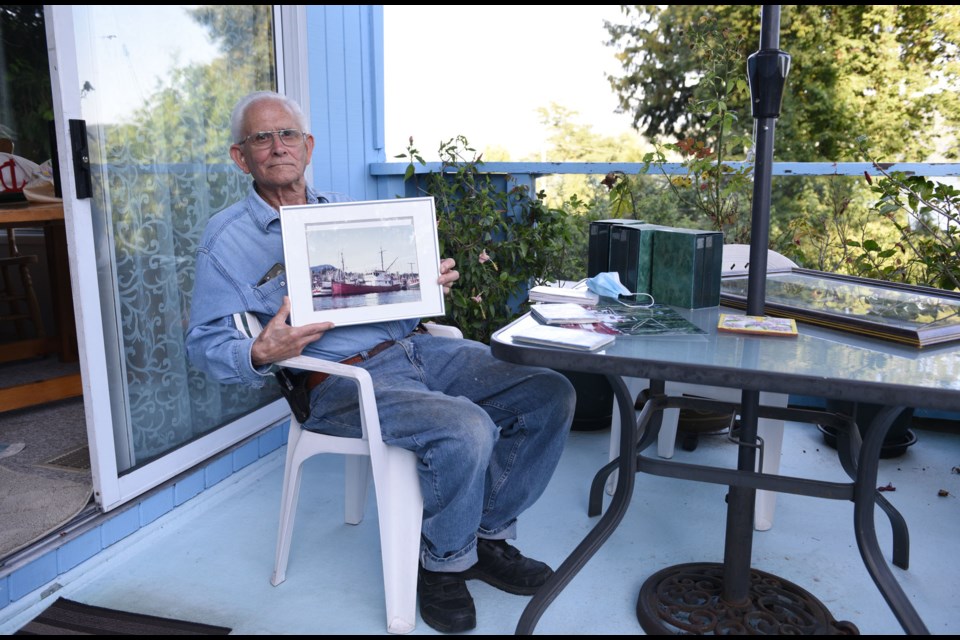Last week tragedy struck when two Canadian fishermen died after their boat sank off the coast of Washington state. As the fishing community comes to terms with the losses, a former owner remembers The Arctic Fox II’s ties to Gibsons fishing culture.
It began with a cod war between the United Kingdon and Iceland in the 1970s.
U.K. vessels were barred from Icelandic waters. Boats couldn’t pull in catches. They languished at docks. Their value plunged.
At the time Ivan Tentchoff and his wife were running an environmental summer camp. They gave children a chance to explore coastal waters from Powell River to Alaska onboard the Arctic Loon and the Arctic Fox.
They were on the hunt for a larger boat to make bigger crossings.
That’s how Tentchoff, now 91, ended up in the Scottish fishing town of Fraserburgh. That’s where he struck gold.
The 20-metre wooden fishing vessel, Golden Sovereign, was built in 1947 by the finest shipbuilder in Scotland, said Tentchoff, and her engine was almost brand new. “I’ve never seen an engine that didn’t have head gaskets,” he said. “You bolted it metal to metal, it was that finely finished.” A few years later the engine alone would be worth five times the $20,000 he paid for the boat. “I got lucky on that one.”
His wife and daughter, Marcie, joined him in Scotland. Their journey home was epic.
They stopped all over – England, Spain, Portugal, the north Coast of Africa, the Canary Islands. They spent Christmas in the Mediterranean. Marcie spent her ninth birthday on the 14-day Atlantic crossing to Barbados, “with flying fish for breakfast, and the old leg-o-mutton sail helping us speed just a bit faster than the diesel engine could on its own,” she said.
They spent the better part of a year on the return to Powell River and the 3,000-gallon fuel tank was filled up just once, in Venezuela, for $273.30.
Once in B.C. the boat was registered and renamed Arctic Fox II, homage to the boats she replaced.
Tentchoff hired a marine architect to design a new house for her, which he built in Powell River.
After one more trip up the coast with students, a conversation with Alaskan fishermen sparked his idea to change course.
Soon, the Arctic Fox was doing what she was built for. By 1977 she was working out of Gibsons Harbour.
Dogfish, halibut and roe herring were pulled into the Fox. So was tuna.
Tentchoff took her more than 1,100 kilometres into the ocean and stayed at sea for months at a time. While fishing in Haida Gwaii, the Fox faced winds of 87 knots per hour, with higher gusts. “No question the boat can handle real weather,” he said.
Former first mate Jan Perry remembers the Fox as a “huge part of this town.” Painted red and white, you could spot her in old photographs of the waterfront. “It was nice to be on the Arctic Fox and coming home because no matter what, people recognized the boat and helped you tie up,” she said.
She dreamed of working on the Fox while working at Hyak Marine Services.
When Tentchoff hired her in 1986, her presence made the Fox all the more unusual. “The crew always made a big fuss when I hired a woman,” said Tentchoff, but for him, it worked. Women working the machinery controls kept an even touch, and they stopped if something went wrong rather than forcing it, he said.
“He hired a girl when everyone told him it was wrong. It means way more to me than a lot of things,” said Perry. At least six women worked on the boat after he hired her.
Unusual perhaps, but that’s what made the Fox a good boat to know.
She had the biggest first aid kit on the Sunshine Coast, said Tentchoff. “We were the medicine kit for the Gibsons fleet in the Charlottes [Haida Gwaii].”
In winter at Gibsons Harbour, soup would always be simmering on the stove with freshly baked buns alongside, ready for any deckhand on the dock. The vessel had a toolkit anyone could use, with tools many didn’t own.
The engine room was kept pristine and polished – easier to see what needed repairing, said Tentchoff. “I rebuilt it once and I hated putting it back together because it was so beautiful inside.”
The Fox was also noticed by the outside world through her brushes with show business. She appeared in episodes of The Beachcombers, The X-Files, a film about the Exxon Valdez disaster. She played a villainous whaling vessel in the 1997 franchise film Free Willy 3: The Rescue.
Eventually, in 2004, Tentchoff made the difficult decision to put her up for sale. “It really was a large part of his soul,” said Marcie. “She was loved.”
The Fox was sold to Sechelt-based Mar-Pat Fishing Ltd. and was sold again in 2012 to owners from Oregon. In 2017 the Fox took harbour at Cowichan Bay Marina on Vancouver Island, according to the Fishing News.
Last week, in the early morning hours, U.S. Coast Guard officers responded to a mayday call in waters off Washington state, 136 kilometres from Cape Flattery. The Arctic Fox II took on water, capsized and was gone.
Two Canadian fishermen, including the skipper, died and one was rescued.
At the time the Fox began taking on water, the wind was blowing at 25 to 30 knots, with three- to four-metre waves and a water temperature of 13 C.
Boats in the Cowichan Bay Marina were flying their flags at half mast the next day to pay respects to the two fishermen who died. The skipper, Tom Lindberg, was a long-time member of the Cowichan Bay Fishermen’s Wharf board of directors.
The Transportation Safety Board is investigating what led to the sinking.
– With files from Katie DeRosa/Times Colonist



